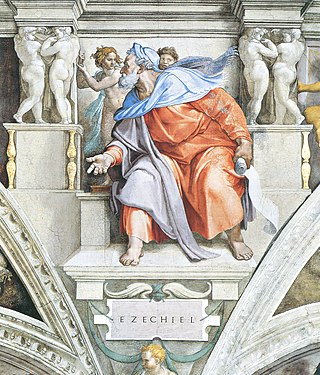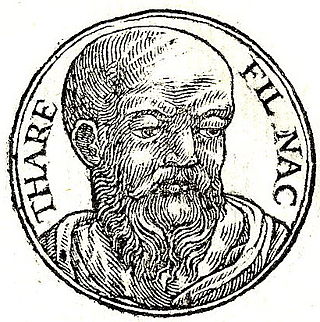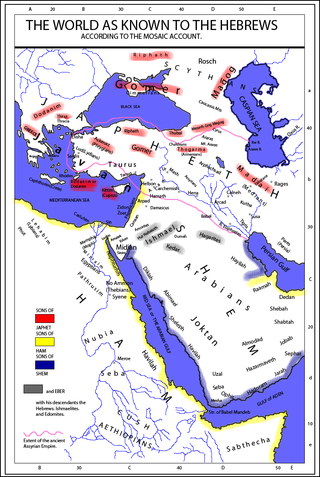Related Research Articles

Ezekiel or Ezechiel is the central protagonist of the Book of Ezekiel in the Hebrew Bible.

Terah or Terach is a biblical figure in the Book of Genesis. He is listed as the son of Nahor and father of the patriarch Abraham. As such, he is a descendant of Shem's son Arpachshad. Terah is mentioned in Genesis 11:26–27, Book of Joshua 24:2, and 1 Chronicles 1:17–27 of the Hebrew Bible and Luke 3:34–36 in the New Testament.

The Generations of Noah, also called the Table of Nations or Origines Gentium, is a genealogy of the sons of Noah, according to the Hebrew Bible, and their dispersion into many lands after the Flood, focusing on the major known societies. The term nations to describe the descendants is a standard English translation of the Hebrew word "goyim", following the c. 400 CE Latin Vulgate's "nationes", and does not have the same political connotations that the word entails today.
Phut or Put is the third son of Ham, in the biblical Table of Nations. The name Put is used in the Bible for Ancient Libya, but a few scholars proposed the Land of Punt known from Ancient Egyptian annals.

Jeconiah, also known as Coniah and as Jehoiachin, was the nineteenth and penultimate king of Judah who was dethroned by the King of Babylon, Nebuchadnezzar II in the 6th century BCE and was taken into captivity. He was the son and successor of King Jehoiakim, and the grandson of King Josiah. Most of what is known about Jeconiah is found in the Hebrew Bible. Records of Jeconiah's existence have been found in Iraq, such as the Jehoiachin's Rations Tablets. These tablets were excavated near the Ishtar Gate in Babylon and have been dated to c. 592 BCE. Written in cuneiform, they mention Jeconiah and his five sons as recipients of food rations in Babylon.
Haran or Aran is a man in the Book of Genesis in the Hebrew Bible. He died in Ur of the Chaldees, was a son of Terah, and brother of Abraham. Through his son Lot, Haran was the ancestor of the Moabites and Ammonites.

Togarmah is a figure in the "table of nations" in Genesis 10, the list of descendants of Noah that represents the peoples known to the ancient Hebrews. Togarmah is among the descendants of Japheth and is thought to represent some people located in Anatolia. Medieval sources claimed that Togarmah was the legendary ancestor of several peoples of the Caucasus.

Baruch ben Neriah was the scribe, disciple, secretary, and devoted friend of the Biblical prophet Jeremiah. He is traditionally credited with authoring the Book of Baruch.
Milcah was the daughter of Haran and the wife of Nahor, according to the genealogies of Genesis. She is identified as the grandmother of Rebecca in biblical tradition, and some texts of the Midrash have identified her as Sarah's sister.

In the account of Terah's family mentioned in the Book of Genesis, Nahor II is listed as the son of Terah, amongst two other brothers, Abram and Haran. His grandfather was Nahor I, son of Serug. Nahor married the daughter of his brother Haran, Milcah, his niece. They may all have been born and raised in the city of Ur: the biblical account states that "Haran died before his father Terah in the land of his birth, in Ur of the Chaldeans".

Jeremiah 1 is the first chapter of the Book of Jeremiah in the Hebrew Bible or the Old Testament of the Christian Bible. This book, one of the Nevi'im or Books of the Prophets, contains the prophecies attributed to the prophet Jeremiah. This chapter serves as an introduction to the Book of Jeremiah and relates Jeremiah's calling as a prophet.

Ezekiel 1 is the first chapter of the Book of Ezekiel in the Hebrew Bible or the Old Testament of the Christian Bible. This book contains prophecies attributed to the prophet/priest Ezekiel, and is one of the Books of the Prophets. In the New King James Version, this chapter is sub-titled "Ezekiel’s Vision of God", and in the New International Version, "Ezekiel’s Inaugural Vision". In the text, the first verse refers to "visions" (plural).

Ezekiel 12 is the twelfth chapter of the Book of Ezekiel in the Hebrew Bible or the Old Testament of the Christian Bible. This book contains the prophecies attributed to the prophet/priest Ezekiel, and is one of the Books of the Prophets. In this chapter, Ezekiel undertakes the "mime of the emigrant" and the chapter concludes with condemnation of some "popular proverbs".

Ezekiel 17 is the seventeenth chapter of the Book of Ezekiel in the Hebrew Bible or the Old Testament of the Christian Bible. This book contains the prophecies attributed to the prophet/priest Ezekiel, and is one of the Books of the Prophets. This chapter tells, and then interprets, the riddle of the great eagle. The original text of this chapter is written in the Hebrew language. This chapter is divided into 24 verses.

Ezekiel 19 is the nineteenth chapter of the Book of Ezekiel in the Hebrew Bible or the Old Testament of the Christian Bible. This book contains the prophecies attributed to the prophet/priest Ezekiel, and is one of the Books of the Prophets. This chapter contains a kinah or lamentation for the rulers of Israel. Two princes are lamented, one captured and carried to Egypt, i.e. Jehoahaz, son and successor of Josiah, and another carried to Babylon, who must be Jehoiachin.

Jeremiah 22 is the twenty-second chapter of the Book of Jeremiah in the Hebrew Bible or the Old Testament of the Christian Bible. This book contains prophecies attributed to the prophet Jeremiah, and is one of the Books of the Prophets.

Jeremiah 16 is the sixteenth chapter of the Book of Jeremiah in the Hebrew Bible or the Old Testament of the Christian Bible. This book contains prophecies attributed to the prophet Jeremiah, and is one of the Books of the Prophets. In the first part of this chapter, Jeremiah is instructed to adopt a lifestyle which will serve as a "symbolic enactment of God's word", comparable to the instructions given to other prophets: see Hosea 1:2–9, Isaiah 8:3–4 and Ezekiel 24:15–24.

Jeremiah 35 is the thirty-fifth chapter of the Book of Jeremiah in the Hebrew Bible or the Old Testament of the Christian Bible. It is numbered as Jeremiah 42 in the Septuagint. This book contains prophecies attributed to the prophet Jeremiah, and is one of the Books of the Prophets. This chapter records the meeting of Jeremiah with the Rechabites, a nomadic clan, in which the prophet "contrast[s] their faithfulness to the commands of a dead ancestor with the faithlessness of the people of Judah to the commands of a living God".
References
- ↑ "Strong's Hebrew: 941. בּוּזִי (Buzi) -- the father of Ezekiel".
- ↑ Genesis 22:21
- ↑ "EZEKIEL - JewishEncyclopedia.com". www.jewishencyclopedia.com. Retrieved 28 February 2024.